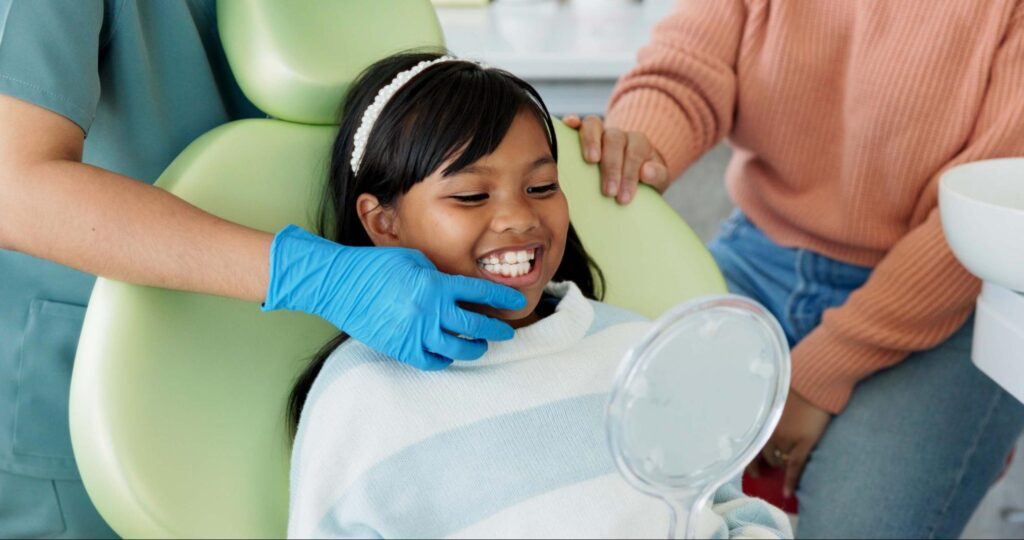Going to the dentist can be spooky and unfamiliar, especially for kids of all ages. At Children’s Dental Center, we do our very best to make sure your child’s visit isn’t full of anxiety. Today, we’ll be answering the question on every parent’s mind: What can I do to help my child overcome dental anxiety?
Recognizing Dental Anxiety
Dental anxiety can affect patients of all ages, not just children! Let’s explore some of the common factors that contribute to this nervousness.
- Pain and Discomfort: Many patients worry about pain during procedures, especially if they’ve had uncomfortable experiences in the past. This concern often extends to needles and injections, which are sometimes necessary for numbing treatments that our doctors perform regularly.
- Sensory Factors: Children, in particular, can have heightened sensory experiences, making the dental office feel overwhelming. Unpleasant sights, sounds, and smells can contribute to their distress.
- Fear of the Unknown: Not knowing what to expect can be a significant source of fear in any medical setting. Communication is crucial in alleviating this anxiety, and we’ll discuss how we address this further.
So now that we know some of the causes of dental anxiety, here are some of the effects:
- Avoidance of dental care can result in significant dental issues. Young patients should receive preventive and interceptive treatment for any emerging problems rather than ignoring them.
- Poor oral hygiene can also develop without intervention and advice from professionals like our team of doctors, Dr. Rowland, Dr. Selecman, Dr. Daniel, Dr. Greene, and Dr. Church.
- Delayed treatment can lead to more serious consequences over time. For instance, a small cavity in childhood can develop into a major issue during adolescence if left untreated.

The Dentist’s Role
Dentists are specialists in their field, and pediatric dentists are specifically trained in caring for children’s dental needs. They are adept at handling anxious patients and creating a soothing office environment. The Children’s Dental Center employs various strategies to alleviate fear and may offer additional suggestions to help ease your child’s anxiety. The most important thing to remember is that you can trust your dentist!
Three Ways To Help
There’s a good amount of helpful advice out there (like asking the fellow parents in your life!), but we’re going to focus on three big factors that are effective for dealing with the anxiety of a pediatric patient:
- Communication:
- Communicating any fear or anxiety you’re experiencing is perhaps the most crucial part of your visit. It’s important to inform your dentist and hygienist so our team can be attentive and considerate throughout your procedure. We can’t address concerns if we’re unaware of them, so whether you’re a parent or a patient, speaking up and asking questions—even if it feels difficult—is essential.
- For instance, during a routine procedure like a filling, we’ll frequently check in to ensure you’re properly numbed and establish a way for you to communicate, such as raising a hand. We also provide detailed explanations as we proceed with each step of the treatment so you’re always informed and comfortable.
- Sedation Dentistry and Distraction:
- For patients with severe anxiety, we use sedation options like nitrous oxide, commonly known as laughing gas. It is a safe and effective sedative that induces a mild state of relaxation and euphoria, helping to make the experience more comfortable for anxious patients. If you have any questions about how nitrous oxide affects pediatric patients or how we use it, don’t hesitate to ask during your visit!
- Distraction can also serve as a natural form of sedation. Many patients find that using in-ear headphones to listen to music or wearing earplugs helps significantly. This technique mutes the sounds of our instruments and provides a comforting distraction. We’ll also establish a method of communication, such as tapping on the patient’s arm, in case they can’t hear us clearly.
- Mental Techniques:
- Often, anxiety is largely a mental challenge. Various relaxation and mindfulness techniques can help manage stress, including during dental visits. Deep, slow breathing can ease anxiety and foster a sense of calm.
- Gradual exposure to our office and observing the care our team provides can also help build positive associations over time. If anxiety remains overwhelming, consider seeking counseling for your child to explore long-term solutions.

Overcoming Fears
Dental anxiety is both common and valid, and we are fully committed to helping your child manage it so they can get the treatment they need. If you have other questions about this issue ahead of your first visit, reach out to our offices in Arlington, Collierville, or Midtown.
 Request an Appointment
Request an Appointment